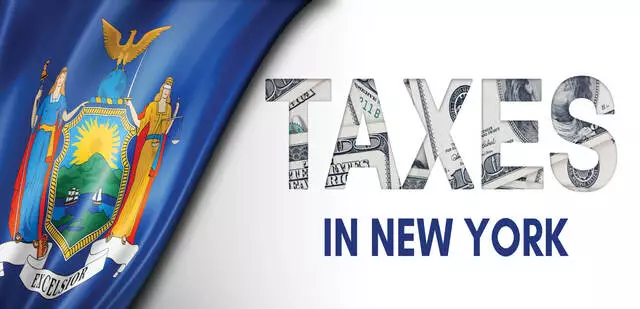
Constant reader: Your TiNY correspondent was vacationing in Kingston, Ontario, Canada, last weekend. And I decided to not risk the wrath of Correspondent Spouse by working on TiNY during my time away. But now I am back. And … there were an order and two ALJ determinations posted. The order is not your ordinary timy, one of the determinations is a very ordinary timy, and the other determination involves a sales tax license revocation dispute.
ALJ Order:
Matter of Ibrahim, Judge Gardiner, July 6, 2023; Div’s Rep. Brandon Batch, Esq.; Pet’s Rep. Isaac Sternheim, CPA; Articles 28 and 29. On May 21, 2020, the Division issued to Petitioner at least three Notices of Determination with numbers ending 8417, 8418 and 8419. These Notices were mailed to an address in Jamaica, N.Y. Petitioner lived in New Jersey at the time and alleged that he didn’t receive the notices. When Petitioner received a Statement of Account showing the tax liabilities, he promptly filed a conference request with the Bureau of Conciliation and Mediation Services (“BCMS”) challenging Notices 8417 and 8418, but that request was not filed until almost a year after the Notices had been issued. Why didn’t Petitioner challenge Notice 8419? It’s a mystery, but not the last one!
BCMS denied, on timeliness grounds, the request challenging the notices ending in 8417 and 8418. Thereafter, Petitioner filed a timely petition challenging the BCMS order.
The Division proved that Notices 8418 and 8419 were sent to Petitioner at his last known address. The proof included (among other sworn statements) affidavits of Division personnel responsible for mailing Notices. But the affidavits addressed the mailing of only Notices 8418 and 8419. Why wasn’t Notice 8417 addressed? Another Mystery!
Petitioner responded with his affidavit stating he had lived in New Jersey since 2017 and first received knowledge of the Notices when he received the Statement of Account. The Statement of Account was sent to the same address in Jamaica, New York, as the Notices. Why did he receive the Statement and not the Notices? Yet another mystery!
Judge Gardiner found that the Division had proven that Notices 8418 and 8419 were properly mailed to Petitioner’s last known address almost a year before Petitioner filed his BCMS request. So, the Judge granted the Division’s motion for summary determination with respect to 8418. But since the Division did not prove the mailing of Notice 8417, Judge Gardiner ordered the case with respect to that notice to proceed to a hearing.
ALJ Determinations:
Matter of Terry, Supervising ALJ Gardiner, July 6, 2023; Div’s Rep. Amanda Alteri, Esq.; Pet’s Rep. pro se; Article 22. First, since Judge Gardiner was not listed as “Acting SALJ” in this case, one assumes her position as Supervising ALJ is now confirmed. Congratulations to Judge Gardiner. As to the determination itself … a typical timy with a typical result. The Division proved it mailed the BCMS Order to Petitioner’s last known address on May 28, 2021. The Petition, filed on March 14, 2022, was late by several months. Case dismissed on the DTA’s motion.
Matter of 9 Ciento Deli and Grocery Corp., Judge Russo, July 6, 2023; Div’s Rep. Eric Gee, Esq.; Pet’s Rep. David Selig CPCU, EA; license suspension under Articles 28 and 29.
Petitioner was a deli and grocery store. Mr. A. was Petitioner’s owner. In November 2019, CID investigators conducted a regulatory inspection of Petitioner. The investigators noticed a shelving unit with cigarettes. The cigarettes carried Virginia stamps, and Mr. A. admitted that Petitioner purchased and sold the cigarettes. The investigators seized the cigarettes and suspended Petitioner’s license to sell cigarettes at retail. That suspension began on January 16 and was to last for six months. Petitioner was on notice that selling cigarettes in New York that didn’t carry New York tax stamps was illegal. So Petitioner wouldn’t ever screw that up again, right?
On January 26, 2020 (ten days after the first suspension began), investigators made a follow-up inspection of Petitioner. This time, the inspection uncovered cigarettes with Virginia and Georgia stamps, but no New York stamped cigarettes. The improperly-stamped cigarettes were seized and Petitioner received a second notice of suspension of its license to sell cigarettes at retail. Because Petitioner was a repeat-offender, this suspension was for three years, and took effect on February 25, 2020. Surely Petitioner’s owner would now understand how seriously New York took the sale of improperly-stamped or unstamped cigarettes in New York and would never allow Petitioner to violate the law again.
But, on January 4, 2021, investigators performed another inspection of Petitioner and found another 17 cartons of cigarettes carrying Virginia tax stamps.
Really?
The cigarettes were seized (again), and this time the Division issued a notice of revocation of Petitioner’s license to sell cigarettes at retail for five years. And the investigators also referred the matter to the Department’s Criminal Enforcement Division which, after review, issued a notice of proposed revocation of Petitioner’s sales tax certificate of authority. The result of that revocation would prohibit Petitioner from selling anything.
At the hearing challenging the proposed revocation, Petitioner did not offer any testimony or other evidence, and Petitioner’s representative conceded that Petitioner received the three violations for selling untaxed cigarettes. But “[w]hile not disputing petitioner’s liability, petitioner’s representative argues that its ‘owner has taken extraordinary measures to avoid this from happening again’ and contends that ‘putting him out of business ... seems unduly harsh.’” Judge Russo was not impressed with this defense. The Judge sustained the Notice of Proposed suspension of Petitioner’s Certificate of Authority under Tax Law § 480-a (4)(a)(iii), which permits the Division to revoke the Certificate of Authority of any taxpayer possessing or selling unstamped or unlawfully-stamped packages of cigarettes three or more times within a period of five years.
I can’t quibble with the result. If there is a red cape that gets the Division’s blood boiling more than the illicit sale of tobacco products, I don’t know what it is. I do, however, take issue with one point raised in the determination. The Judge states: “this forum does not have the jurisdictional authority to mandate a settlement agreement between petitioner and the Division (see Matter of Cal Snyder, Tax Appeals Tribunal, May 5, 2011).” I agree that the cited authority stands for the stated proposition. But, and this has been bothering me for a while, I think the Tribunal had it wrong in Cal Snyder.
The Tax Law explicitly empowers the Tax Appeals Tribunal and the ALJs as follows:
“To have the same power and authority as the commissioner of taxation and finance in any instance where such commissioner is authorized to impose, modify or waive interest, additions to tax or civil penalties under this chapter, the environmental conservation law, the general city law, or in any local law, ordinance or resolution imposing taxes pursuant to the authority thereof, and to designate and authorize by resolution of the tax appeals tribunal, duly entered upon its minutes, officers, administrative law judges, and other employees of the division to perform any of such functions.”
Tax Law § 2006(12).
The statute is clear: If the Commissioner has the authority to take an action, then the Tribunal has the authority to take the same action and can delegate that authority to the ALJs. The Commissioner has the authority to compel the Division to settle cases under Tax Law 171 (Eighteenth) (among other provisions of the Tax Law). And if the Commissioner has that authority, so too does the Tribunal (and the ALJs, assuming the Tribunal has delegated the authority).
The People of the State of New York, acting through its legislative bodies, have bestowed the Tribunal with the same authority as the Commissioner. The Tribunal should use that authority to advance the just enforcement of New York’s tax laws.

